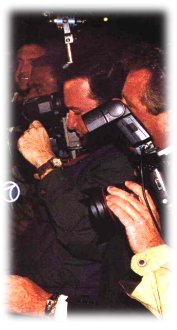|
|

Jewish World Review / June 29, 1998 / 5 Tamuz, 5758
Clarence Page
WASHINGTON --- What? The major media? Too conservative?
Now, there's a point of view you don't hear very often these days.
Voices ranging from Sen. Jesse Helms, R-N.C., to Rush Limbaugh, the syndicated talk show host, have been howling for years about "liberal media" bias.
As you can see on its Internet home page, FAIR has found numerous examples of what it perceives as a conservative bias in news and public policy coverage.
Now the group has come out with a new poll of Washington's press corps that shows a profile more complicated than either side of the dispute has talked much about.
The survey of Washington journalists working at 78 major newspapers, magazines, television networks and wire services was conducted for FAIR by a professor at Virginia Commonwealth University.
It found that, while most of those surveyed identified themselves as "centrists," they leaned to the left of mainstream Americans on social issues, but decidedly to the right on economic issues.
For example, on health insurance, 32 percent of the journalists in the FAIR survey felt requiring employers to provide health insurance to their employees should be "one of the top few priorities," while a larger 47 percent of the general public did in a 1996 Greenberg Research Inc. survey.
Similarly 59 percent of the general public saw the need to "protect Medicare and Social Security against major cuts" as "one of the top priorities," compared to only 39 percent of journalists.
The biggest gap came over NAFTA. Of journalists, 24 percent put expanding the trade agreement to other countries in Latin America among the "top few" priorities. Only 7 percent of the general public felt the same, while 44 percent - compared to just 8 percent of journalists - put it "toward the bottom of the list" of priorities.
What does this prove? Not much, in my view. The personal views of reporters and editors (as opposed to commentators like me, whose views are here for all to see) are not supposed to matter in any detectable way when a journalist is doing his or her job.
Conservatives made much hay out of a 1996 Roper survey for the Freedom Forum that showed more than 80 percent of the Washington reporters who responded had voted for Bill Clinton. But you would have a hard time guessing who those reporters were by reading their work, precisely because good journalists are supposed to be fair, but also skeptical, of everyone.
In the early 1970s when the Washington Post's Bob Woodward was breaking the original Watergate exposes, along with his partner Carl Bernstein, conservatives howled at the "liberal media" conspirators, even though most other media left the Post hanging out pretty much by itself for many months without picking up the story.
We also need to consider the source of the criticism. In the '60s, when liberal and progressive politics were on the rise, the major media were accused just as often of being too conservative. As the left has declined in political influence, most of the criticism has been coming from the right, partly, it seems, because there's hardly a left left.
These days when I hear someone call the media too "liberal," I reasonably ask how they define "liberal." Limbaugh seems to define it as anyone who doesn't agree with him. FAIR sometimes shows the same definition for "conservative." As long as we're being criticized by both sides, a senior editor at a prominent newspaper told me, we in the media must be doing something right.
If you're going to mistrust the media, do it for the right reasons. Show the same attribute good reporters are supposed to show: a healthy skepticism. When you see what appears to you to be flagrant bias, you may have a good "gotcha." Good. Tell us about it.
But you also may be seeing something you need to know, even when the knowledge is painful enough to make you want to blame the messenger for the message.
When that happens, journalists are not showing a bias, except for a good story, which is the only bias any should be
 Have conservatives
Have conservatives
won the media game?
But it is a conservative bias that concerns the New York-based Fairness and Accuracy in Reporting.
All subscribers to
American Spectator? More recently, Woodward and other Washington Post reporters have produced some of the most explosive Whitewater exclusives, sometimes forcing Attorney General Janet Reno to play catch up. This time the cries from the right are oddly muted, although I have heard some, like former Richard Nixon adviser Pat Buchanan, praise Woodward's Whitewater reporting, without saying anything about Woodward's earlier work.
More recently, Woodward and other Washington Post reporters have produced some of the most explosive Whitewater exclusives, sometimes forcing Attorney General Janet Reno to play catch up. This time the cries from the right are oddly muted, although I have heard some, like former Richard Nixon adviser Pat Buchanan, praise Woodward's Whitewater reporting, without saying anything about Woodward's earlier work.
